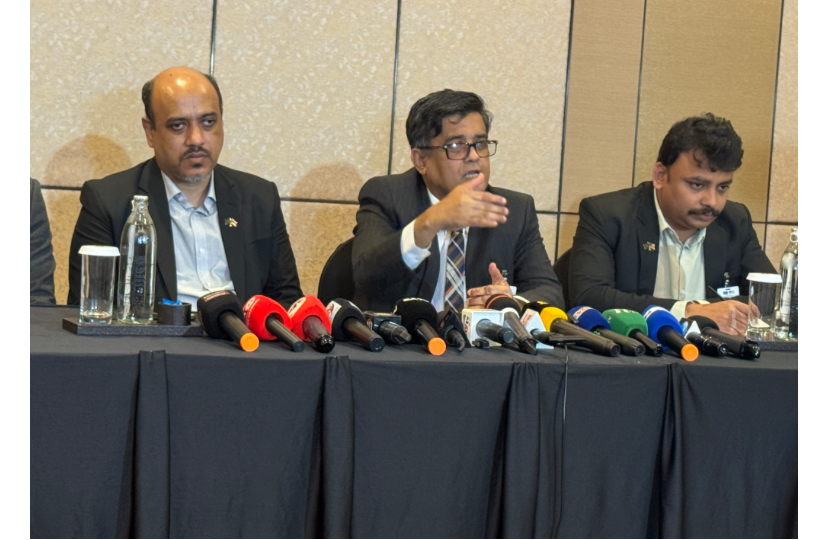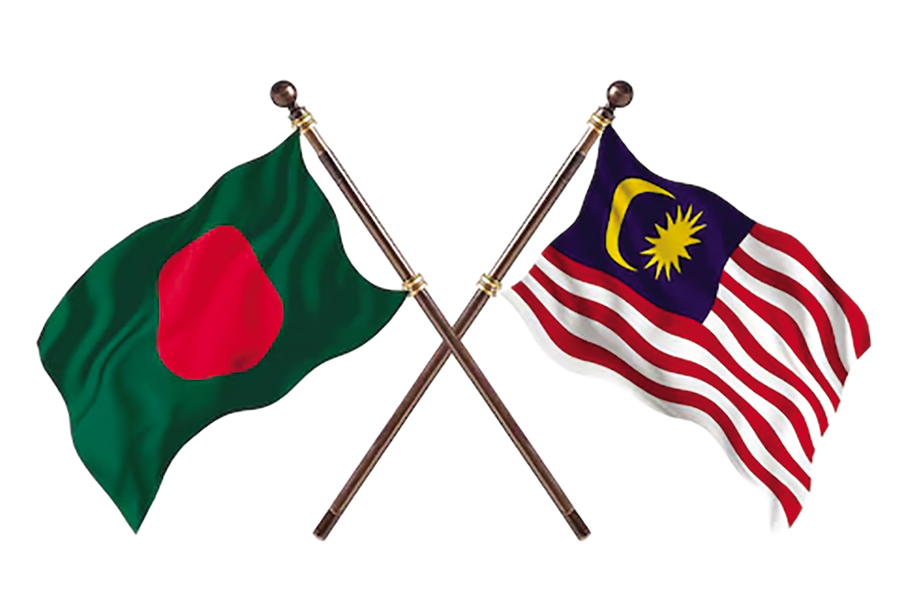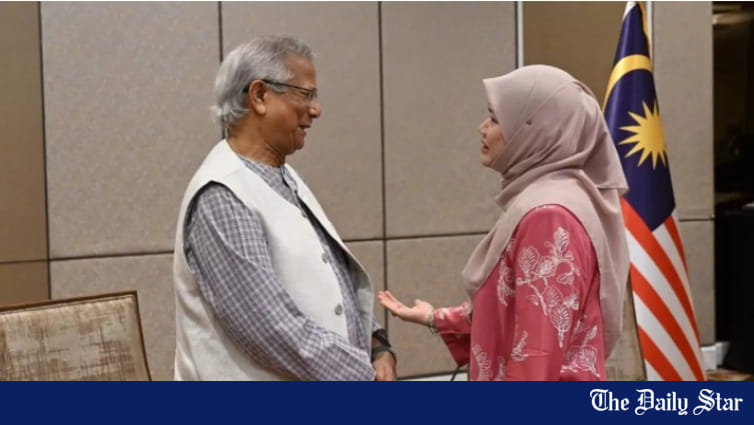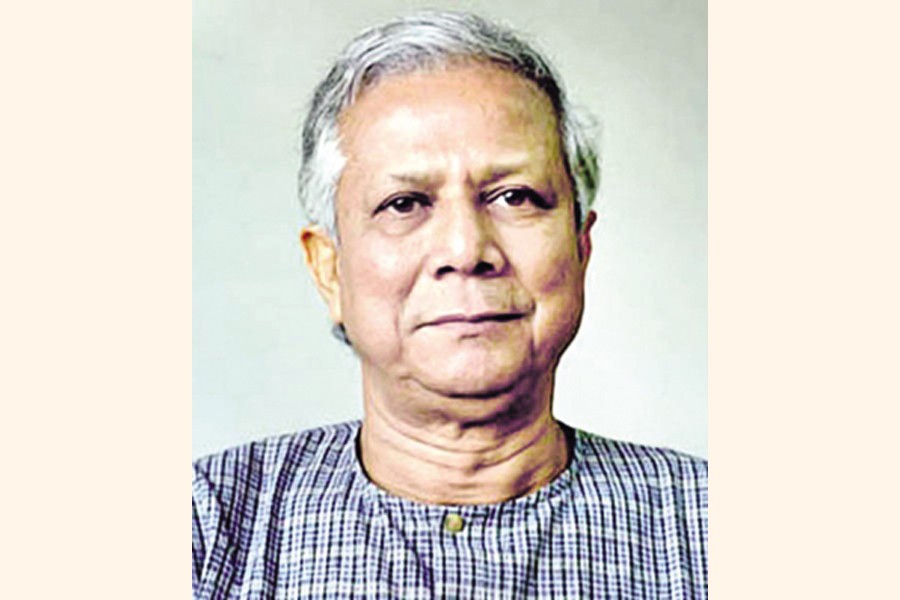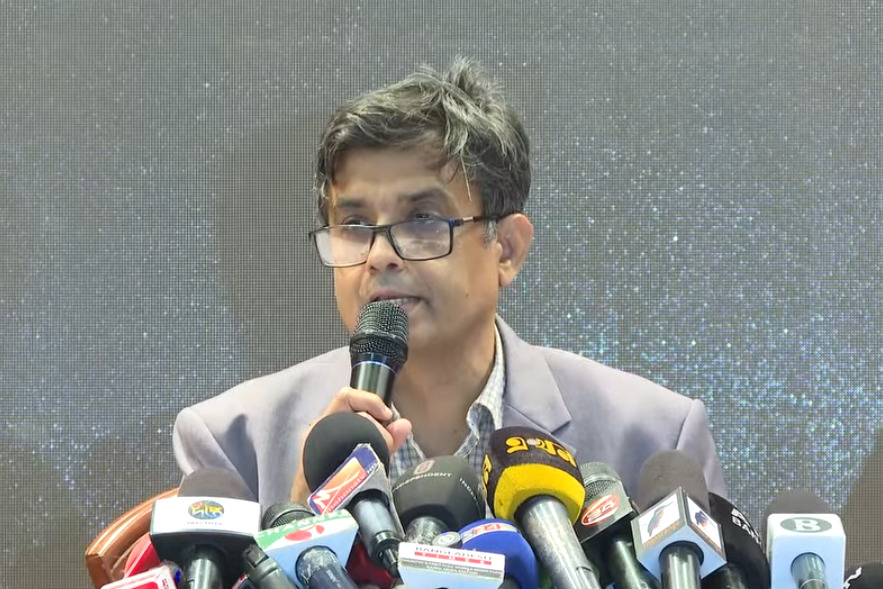Saif
Senior Member
- Messages
- 17,408
- Likes
- 8,373
- Nation

- Residence

- Axis Group

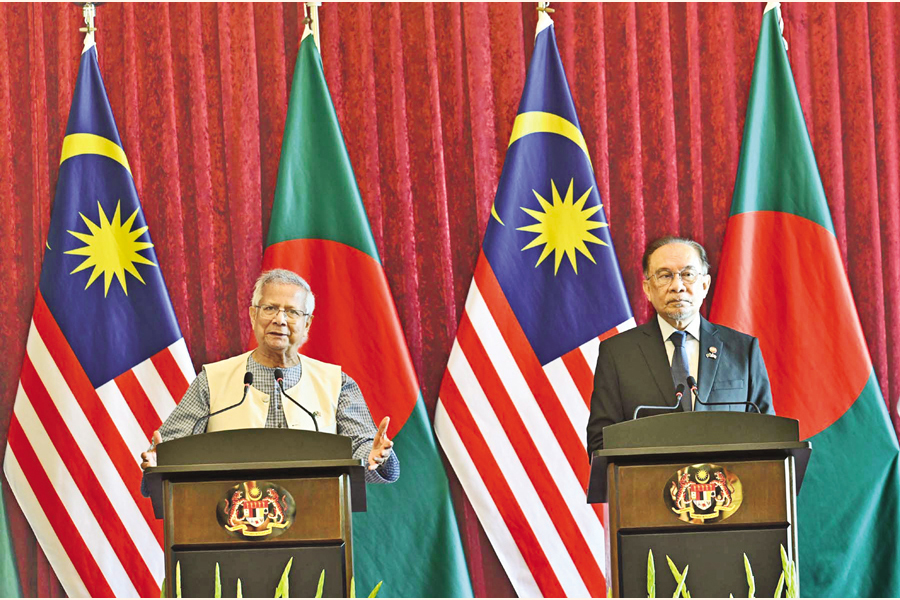
Dhaka, KL ink MoUs on defence and energy
Bangladesh and Malaysia Tuesday agreed to deepen ties at summit talks capped with the adoption of eight instruments of cooperation with thrust on economy, investment, free trade, and labour recruitment. The signing of five memorandums of understanding (MoUs) and exchange of three notes on cooperat
Eight instruments of cooperation signed
Dhaka, KL ink MoUs on defence and energy
FE REPORT
Published :
Aug 13, 2025 00:35
Updated :
Aug 13, 2025 00:35

Chief Adviser Prof Muhammad Yunus and Malaysian Prime Minister Anwar Ibrahim speak at a joint press meet at the latter's office in Putrajaya on Tuesday. — PID
Bangladesh and Malaysia Tuesday agreed to deepen ties at summit talks capped with the adoption of eight instruments of cooperation with thrust on economy, investment, free trade, and labour recruitment.
The signing of five memorandums of understanding (MoUs) and exchange of three notes on cooperation followed talks between visiting Bangladesh Chief Adviser Prof Muhammad Yunus and Malaysian Prime Minister Dato' Seri Anwar bin Ibrahim at Perdana Putra in Putrajaya, where the leaders reaffirmed their commitment to transforming the Bangladesh-Malaysia relations into a deeper, future-orientated strategic partnership.
The two leaders first had a one-on-one conclave, preceded by a restricted session with select senior officials. Later, they led delegation-level talks covering a wide range of bilateral issues, including trade, investment, labour migration, energy cooperation, blue economy, education, and cultural exchanges, said a spokesperson for the CA Office.
"Our two countries share a deep bond rooted in history, religion, and cultural empathy. Malaysia is a unique partner of Bangladesh, particularly in human resources, trade, and people-to-people contacts," the head of interim government of Bangladesh said at the outset of the delegation-level talks.
Prime Minister Anwar described Professor Yunus as "a friend of Malaysia" and commended his leadership of Bangladesh's Interim Government over the past year. He emphasised the need to boost trade and expand cooperation in migrant-worker welfare and education, and efforts to resolve the nagging Rohingya crisis.
During the one-on-one meeting, Professor Yunus thanked Malaysia for facilitating the entry of nearly 8,000 stranded Bangladeshi workers under a simplified protocol and for introducing multiple-entry visas, and allowing workers to return home during emergencies without risking their jobs.
Both sides underscored the importance of transparent and fair recruitment processes to reduce costs and safeguard worker welfare.
At the delegation-level talks, Adviser on Law, Justice and Overseas Employment Prof Asif Nazrul urged Malaysia to recruit more skilled Bangladeshi professionals, including doctors and engineers, through a government-to-government framework.
He noted that Bangladesh's state-run BOESL agency is now capable of handling recruitment for Malaysian companies and called for opportunities for Bangladeshi security guards and caregivers. He also requested steps to be taken for the regularisation of undocumented Bangladeshi workers.
Malaysian officials confirmed that Bangladeshi workers would now be entitled to the same social security benefits as Malaysian workers and be able to lodge complaints in the Bangla language.
Bangladesh also requested "Graduate Pass" visas for thousands of its students in Malaysian universities. Currently, up to 10,000 Bangladeshi students are studying in Malaysia.
The leaders discussed Bangladesh's aspiration to deepen engagement with the economic bloc ASEAN, including its bid for Sectoral Dialogue Partner status, and sought Malaysia's support during its chairmanship of the association.
Professor Yunus also invited Malaysia to participate in the upcoming Conference on the Rohingya Crisis in Cox's Bazar and the UN-led international conference on the Rohingya issue in New York in September. He thanked Malaysia for its consistent support to the Rohingya people.
On economic matters, the two sides agreed to accelerate negotiations on a Bangladesh-Malaysia Free-Trade Agreement, strengthen investment cooperation through Special Economic Zones, and operationalise the Malaysia-Bangladesh Joint Business Council.
Highlighting the growing trade imbalance between the two friendly countries, Dhaka sought greater market access for Bangladeshi products such as medicines, batteries, footwear, ceramics and jute to the Malaysian market.
Bangladesh sought Malaysia's support in developing its Blue Economy and Halal industry, including establishing a Halal Economic Zone outside Dhaka, and expressed interest in joining the Regional Comprehensive Economic Partnership (RCEP).
Both countries welcomed the signing of a new MoU on LNG supply and energy cooperation and agreed to explore renewable energy partnerships. They also discussed collaboration in defence, culture, and tourism. Prime Minister Anwar expressed his admiration for Rabindranath Tagore and proposed a cultural conference on prominent Asian writers and thinkers.
After the bilateral meeting, Bangladesh and Malaysia signed five Memorandums of Understanding and exchanged three notes in different areas of cooperation.
Chief Adviser Prof Yunus and Malaysian Prime Minister Anwar Ibrahim witnessed the signing of the eight cooperation documents-five MoUs and three Exchange of Notes.
The first note of exchange provides for cooperation in the field of higher education. Malaysian foreign minister Dato' Seri Utama Haji Mohamad bin Haji Hasan and Bangladesh's foreign adviser Md Touhid Hossain exchanged the note.
The second note, on Training for Diplomats, was also exchanged by the two foreign-ministry chiefs.
The third exchange of note is on cooperation in the field of Halal Ecosystem. Deputy Minister in Malaysian Prime Minister's Department Senator Dr Zulkifli bin Hasan and Bangladesh Investment Development Authority (BIDA) Executive Chairman Chowdhury Ashik Mahmud bin Harun exchanged.
The first MoU between the Government of Malaysia and the Government of the People's Republic of Bangladesh is on defence cooperation. Malaysian defence minister Dato' Seri Mohamed Khaled bin Nordin and Bangladesh's foreign adviser Md. Touhid Hossain signed the accord.
The second MoU between the Government of Malaysia and the Government of the People's Republic of Bangladesh is about cooperation in the field of liquefied natural gas (LNG) supply, LNG infrastructure, petroleum products and their infrastructure.
Malaysian acting economic minister Datuk Seri Amir Hamzah bin Azizan and Bangladesh's energy adviser M Fouzul Kabir Khan signed the draft deal.
The third MoU is on cooperation between the Institute of Strategic and International Studies Malaysia and the Bangladesh Institute of International and Strategic Studies.
Institute of Strategic and International Studies (ISIS) Malaysia Chairman Datuk Professor Dr Mohd FaizAbdullah and Bangladesh High Commissioner in Malaysia Md. Shameem Ahsan signed the MoU.
The fourth memo is on collaboration between MIMOS Services Sdn Bhd and the Bangladesh-Malaysia Chamber of Commerce & Industry (BMCCI). MIMOS Services Sdn. Bhd. (MSSB) Chief Executive Officer (CEO) Mohamad Fauzi Yahaya and BMCCI Shabbir Ahmed Khan signed the MoU.
The fifth MoU is signed between the National Chamber of Commerce and Industry of Malaysia (NCCIM) and the Federation of Bangladesh Chambers of Commerce and Industry (FBCCI).
NCCIM president Dato' Seri N. Gobalakrishnan and FBCCI administrator Md. Hafizur Rahman signed the MoU.
The talks over, Prime Minister Anwar hosted a luncheon in honour of the Chief Adviser at the official residence of the Malaysian prime minister.
Bangladesh's delegation includes Foreign Adviser Touhid Hossain, Energy Adviser Fouzul Kabir Khan, National Security Adviser Dr Khalilur Rahman, Special Envoy Lutfey Siddiqi, BIDA Executive Chairman Chowdhury Ashik Mahmud Bin Harun, SDG Coordinator Lamiya Morshed and Foreign Secretary Asad Alam Siam.
The Chief Adviser is on a three-day official visit to Malaysia on August 11-13.
Dhaka, KL ink MoUs on defence and energy
FE REPORT
Published :
Aug 13, 2025 00:35
Updated :
Aug 13, 2025 00:35
Chief Adviser Prof Muhammad Yunus and Malaysian Prime Minister Anwar Ibrahim speak at a joint press meet at the latter's office in Putrajaya on Tuesday. — PID
Bangladesh and Malaysia Tuesday agreed to deepen ties at summit talks capped with the adoption of eight instruments of cooperation with thrust on economy, investment, free trade, and labour recruitment.
The signing of five memorandums of understanding (MoUs) and exchange of three notes on cooperation followed talks between visiting Bangladesh Chief Adviser Prof Muhammad Yunus and Malaysian Prime Minister Dato' Seri Anwar bin Ibrahim at Perdana Putra in Putrajaya, where the leaders reaffirmed their commitment to transforming the Bangladesh-Malaysia relations into a deeper, future-orientated strategic partnership.
The two leaders first had a one-on-one conclave, preceded by a restricted session with select senior officials. Later, they led delegation-level talks covering a wide range of bilateral issues, including trade, investment, labour migration, energy cooperation, blue economy, education, and cultural exchanges, said a spokesperson for the CA Office.
"Our two countries share a deep bond rooted in history, religion, and cultural empathy. Malaysia is a unique partner of Bangladesh, particularly in human resources, trade, and people-to-people contacts," the head of interim government of Bangladesh said at the outset of the delegation-level talks.
Prime Minister Anwar described Professor Yunus as "a friend of Malaysia" and commended his leadership of Bangladesh's Interim Government over the past year. He emphasised the need to boost trade and expand cooperation in migrant-worker welfare and education, and efforts to resolve the nagging Rohingya crisis.
During the one-on-one meeting, Professor Yunus thanked Malaysia for facilitating the entry of nearly 8,000 stranded Bangladeshi workers under a simplified protocol and for introducing multiple-entry visas, and allowing workers to return home during emergencies without risking their jobs.
Both sides underscored the importance of transparent and fair recruitment processes to reduce costs and safeguard worker welfare.
At the delegation-level talks, Adviser on Law, Justice and Overseas Employment Prof Asif Nazrul urged Malaysia to recruit more skilled Bangladeshi professionals, including doctors and engineers, through a government-to-government framework.
He noted that Bangladesh's state-run BOESL agency is now capable of handling recruitment for Malaysian companies and called for opportunities for Bangladeshi security guards and caregivers. He also requested steps to be taken for the regularisation of undocumented Bangladeshi workers.
Malaysian officials confirmed that Bangladeshi workers would now be entitled to the same social security benefits as Malaysian workers and be able to lodge complaints in the Bangla language.
Bangladesh also requested "Graduate Pass" visas for thousands of its students in Malaysian universities. Currently, up to 10,000 Bangladeshi students are studying in Malaysia.
The leaders discussed Bangladesh's aspiration to deepen engagement with the economic bloc ASEAN, including its bid for Sectoral Dialogue Partner status, and sought Malaysia's support during its chairmanship of the association.
Professor Yunus also invited Malaysia to participate in the upcoming Conference on the Rohingya Crisis in Cox's Bazar and the UN-led international conference on the Rohingya issue in New York in September. He thanked Malaysia for its consistent support to the Rohingya people.
On economic matters, the two sides agreed to accelerate negotiations on a Bangladesh-Malaysia Free-Trade Agreement, strengthen investment cooperation through Special Economic Zones, and operationalise the Malaysia-Bangladesh Joint Business Council.
Highlighting the growing trade imbalance between the two friendly countries, Dhaka sought greater market access for Bangladeshi products such as medicines, batteries, footwear, ceramics and jute to the Malaysian market.
Bangladesh sought Malaysia's support in developing its Blue Economy and Halal industry, including establishing a Halal Economic Zone outside Dhaka, and expressed interest in joining the Regional Comprehensive Economic Partnership (RCEP).
Both countries welcomed the signing of a new MoU on LNG supply and energy cooperation and agreed to explore renewable energy partnerships. They also discussed collaboration in defence, culture, and tourism. Prime Minister Anwar expressed his admiration for Rabindranath Tagore and proposed a cultural conference on prominent Asian writers and thinkers.
After the bilateral meeting, Bangladesh and Malaysia signed five Memorandums of Understanding and exchanged three notes in different areas of cooperation.
Chief Adviser Prof Yunus and Malaysian Prime Minister Anwar Ibrahim witnessed the signing of the eight cooperation documents-five MoUs and three Exchange of Notes.
The first note of exchange provides for cooperation in the field of higher education. Malaysian foreign minister Dato' Seri Utama Haji Mohamad bin Haji Hasan and Bangladesh's foreign adviser Md Touhid Hossain exchanged the note.
The second note, on Training for Diplomats, was also exchanged by the two foreign-ministry chiefs.
The third exchange of note is on cooperation in the field of Halal Ecosystem. Deputy Minister in Malaysian Prime Minister's Department Senator Dr Zulkifli bin Hasan and Bangladesh Investment Development Authority (BIDA) Executive Chairman Chowdhury Ashik Mahmud bin Harun exchanged.
The first MoU between the Government of Malaysia and the Government of the People's Republic of Bangladesh is on defence cooperation. Malaysian defence minister Dato' Seri Mohamed Khaled bin Nordin and Bangladesh's foreign adviser Md. Touhid Hossain signed the accord.
The second MoU between the Government of Malaysia and the Government of the People's Republic of Bangladesh is about cooperation in the field of liquefied natural gas (LNG) supply, LNG infrastructure, petroleum products and their infrastructure.
Malaysian acting economic minister Datuk Seri Amir Hamzah bin Azizan and Bangladesh's energy adviser M Fouzul Kabir Khan signed the draft deal.
The third MoU is on cooperation between the Institute of Strategic and International Studies Malaysia and the Bangladesh Institute of International and Strategic Studies.
Institute of Strategic and International Studies (ISIS) Malaysia Chairman Datuk Professor Dr Mohd FaizAbdullah and Bangladesh High Commissioner in Malaysia Md. Shameem Ahsan signed the MoU.
The fourth memo is on collaboration between MIMOS Services Sdn Bhd and the Bangladesh-Malaysia Chamber of Commerce & Industry (BMCCI). MIMOS Services Sdn. Bhd. (MSSB) Chief Executive Officer (CEO) Mohamad Fauzi Yahaya and BMCCI Shabbir Ahmed Khan signed the MoU.
The fifth MoU is signed between the National Chamber of Commerce and Industry of Malaysia (NCCIM) and the Federation of Bangladesh Chambers of Commerce and Industry (FBCCI).
NCCIM president Dato' Seri N. Gobalakrishnan and FBCCI administrator Md. Hafizur Rahman signed the MoU.
The talks over, Prime Minister Anwar hosted a luncheon in honour of the Chief Adviser at the official residence of the Malaysian prime minister.
Bangladesh's delegation includes Foreign Adviser Touhid Hossain, Energy Adviser Fouzul Kabir Khan, National Security Adviser Dr Khalilur Rahman, Special Envoy Lutfey Siddiqi, BIDA Executive Chairman Chowdhury Ashik Mahmud Bin Harun, SDG Coordinator Lamiya Morshed and Foreign Secretary Asad Alam Siam.
The Chief Adviser is on a three-day official visit to Malaysia on August 11-13.

